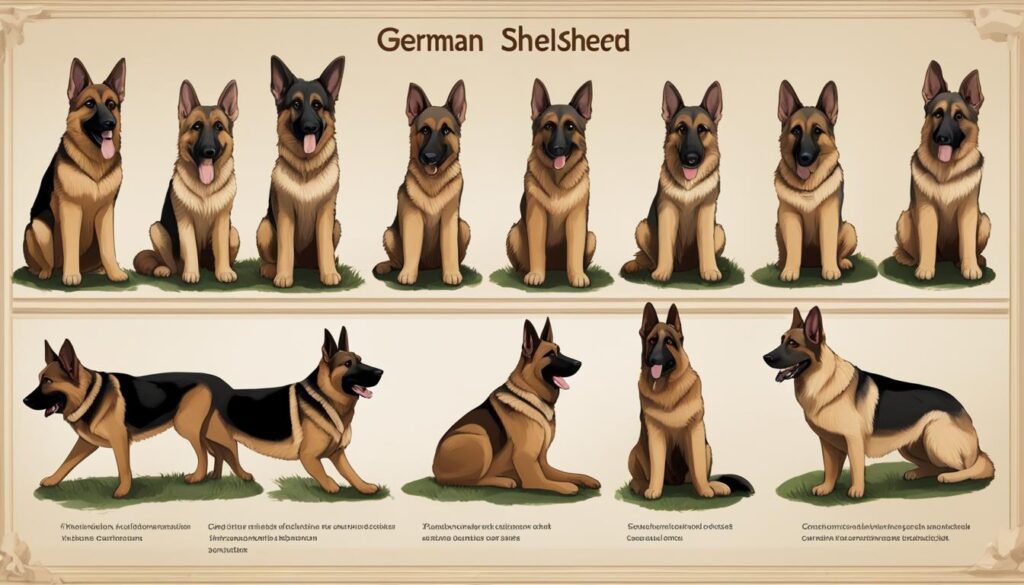If you’ve been wondering why your German Shepherd is smaller than expected, you’ve come to the right place. While German Shepherds are generally known for their size and stature, it is not uncommon for some to be smaller than others. In this section, we’ll explore the reasons behind a small German Shepherd, including genetics, health, and other factors.
Key Takeaways:
- A German Shepherd may be smaller than expected due to genetics and health issues.
- Breeding practices can also affect the size of the breed.
- Understanding the factors that influence size can help you appreciate your German Shepherd’s unique characteristics.
- Small German Shepherds can still make great pets.
- Regular veterinary check-ups can help ensure your dog is healthy and thriving.
Factors Influencing German Shepherd Size
It’s not uncommon for German Shepherds to come in smaller sizes, such as miniature German Shepherds or tiny German Shepherds. There are several factors that can play a role in their size.
Genetics: One of the most significant factors that influence a German Shepherd’s size is genetics. Size can be determined by the dog’s parents, so if both parents were on the smaller side, their offspring is likely to be smaller as well. On the contrary, if both parents were larger, their offspring is more likely to be larger as well.
Breeding Practices: Another significant factor that can affect German Shepherd size is breeding practices. Some breeders intentionally breed smaller German Shepherds to create “miniature” versions of the breed. These practices can result in various sizes and have their own set of potential health problems.
Health Issues: Health conditions can also contribute to a German Shepherd’s smaller size. For example, if your dog has an underlying health problem that affects their growth, such as a thyroid condition or malnutrition, they may be smaller than expected. Always make sure to provide your German Shepherd with a balanced and nutritious diet and take them for regular check-ups with a veterinarian.
To better understand the various factors that can influence German Shepherd size, consider the helpful table below:


Factors Influencing German Shepherd Size
| Factor | Influence |
|---|---|
| Genetics | Determining factor of size inherited from parents |
| Breeding Practices | Intentional breeding of smaller dogs results in smaller sizes, potentially causing further health concerns |
| Health Issues | Underlying health problems can affect growth and result in smaller sizes |
Understanding the factors that influence your German Shepherd’s size can help you better care for their unique needs and appreciate their distinctive qualities.
Conclusion
So, if you’ve been wondering why your German Shepherd is smaller than expected, there are a few key factors to consider. Genetics plays a significant role in a dog’s size, and sometimes, smaller German Shepherds may be the result of breeding practices that prioritize miniature or toy breeds.
However, it’s also important to keep in mind that certain health issues can impact a German Shepherd’s growth and overall size. Whether your pup is a small German Shepherd or simply on the smaller side of the breed’s size spectrum, it’s crucial to consult with your vet regularly to ensure they’re healthy and thriving.
All in all, understanding the factors that influence German Shepherd size can help you better appreciate your furry friend’s unique attributes. So embrace your small size dog and enjoy the special bond you share with your German Shepherd!
FAQ
Why is my German Shepherd smaller than expected?
There can be several reasons why your German Shepherd is smaller than expected. One factor is genetics, as some German Shepherds may simply have genes that make them smaller in size. Additionally, health issues can also play a role in stunting a dog’s growth. It’s important to consult with a veterinarian to rule out any potential health concerns.
Is it common for German Shepherds to be small?
German Shepherds are generally not considered small dogs. They are typically medium to large-sized dogs with a well-built and muscular body. However, variations in size can occur within the breed due to factors such as genetics, breeding practices, and individual differences. If you have concerns about your German Shepherd’s size, it’s best to seek advice from a veterinarian.
Are there miniature or tiny German Shepherds?
While there are no officially recognized miniature German Shepherds, there are some breeders who may selectively breed smaller German Shepherds in an attempt to create a miniature version. However, it’s important to note that these dogs may not conform to the breed standards and can be more prone to health issues. It’s recommended to take caution when considering a miniature or tiny German Shepherd and to choose a reputable breeder.
Can diet affect the size of a German Shepherd?
A balanced diet is crucial for the overall growth and development of a German Shepherd, but it alone cannot significantly alter their size. Genetics and other factors play a more significant role in determining a dog’s size. However, providing proper nutrition and feeding your German Shepherd according to their specific needs is always important for their overall health and well-being.
Can medical conditions cause a German Shepherd to be small?
Yes, certain medical conditions can contribute to a German Shepherd being smaller in size. For example, hormonal imbalances, malnutrition, or developmental issues can lead to stunted growth. If you suspect that your German Shepherd’s size is affected by a medical condition, it’s crucial to consult with a veterinarian for a proper diagnosis and treatment.

